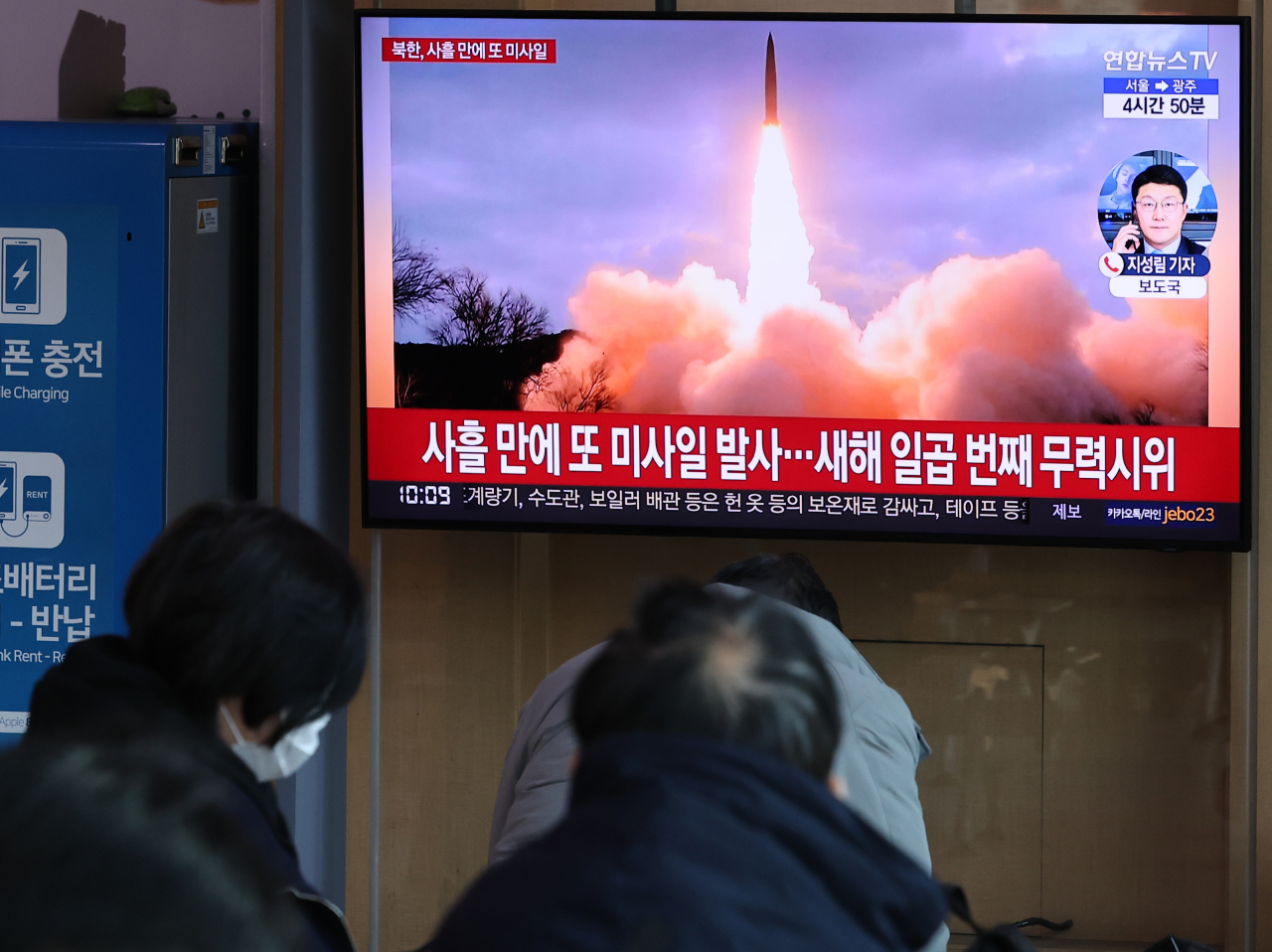The defense chiefs of South Korea, the US, and Japan on Thursday committed to “closely cooperate” against North Korean threats and hold an in-person ministerial meeting during a trilateral phone call, South Korea’s Defense Ministry announced.
South Korean Defense Minister Suh Wook had a 30-minute phone discussion with US Secretary of Defense Lloyd Austin and Japanese Defense Minister Nobuo Kishi that started at 7:45 a.m.
The three defense chiefs “shared an assessment on the situation on the Korean Peninsula and in the region” and saw eye to eye on close trilateral coordination in countering the growing menace from Pyongyang, the South Korean Defense Ministry said in a press statement.
“(The ministers) committed to the three countries’ close cooperation in the face of North Korean missile threats and to continue efforts at achieving denuclearization of the Korean Peninsula.”
During the phone call, Suh emphasized the “recent series of missile test launches by North Korea including an intermediate-range ballistic missile are a direct and grave threat” to South Korea.
The South Korean defense minister went on to say that a spate of missile launches “incurs instability to the regional situation and is a challenge against United Nations Security Council resolutions.”
What appears to be the first and unprecedented trilateral phone discussion among the South Korean, US, and Japanese defense chiefs came conspicuously after North Korea’s record-breaking flurry of missile launches.
Pyongyang fired off nine ballistic missiles and two land-attack cruise missiles (LACM) in seven discrete launches in January alone. Recently launched missiles by North Korea, including a KN-23, KN-24, and Maneuverable Reentry Vehicle (MaRV), have notably enhanced survivability and maneuverability.
Suh also reiterated that South Korea has “deterred and responded to North Korea’s mounting nuclear and missile threats with independent available capabilities including the military’s nuclear-WMD Response System and based on the ironclad South Korea-US alliance.”
The minister also pledged to further reinforce the military capabilities and alliance coordination.
Sending coordinate message The US Defense Department on Wednesday (local time) said the three defense chiefs reaffirmed the “importance of trilateral security cooperation in addressing global security challenges and threats posed” by North Korea’s weapons of mass destruction and missile programs.
The Pentagon also reiterated that the leaders committed to “close trilateral coordination in the face of the DPRK’s missile launches,” confirming that the “US commitment to the defense of Japan and the ROK is ironclad.”
A South Korean official, who wished to remain anonymous, emphasized that the primary goal of the first phone discussion was for the South Korean, US, and Japanese defense chiefs to “send a coordinated message” in responding to successive missile launches by North Korea.
The meeting was a signal to Pyongyang that they had a coordinated response, rather than one where they discussed any detailed agenda on other issues.
Pushing for trilateral defense ministerial talksThe three defense chiefs also committed to “hold an in-person trilateral defense ministerial meeting on a mutually determined future date,” according to the respective announcements by Seoul and Washington.
A three-way defense ministerial meeting has yet to take place under the Biden administration.
Seoul, Washington, and Tokyo last held in-person trilateral defense ministerial talks in Bangkok in November 2019 on the occasion of the ASEAN Defense Ministers’ Meeting-Plus.
A trilateral meeting, which had been scheduled to be held in January in Hawaii, was canceled due to the rapid spread of the omicron variant.
The South Korean official said the three leaders commonly saw the necessity of holding in-person talks “at the earliest possible time” to have a detailed and substantial discussion on North Korea’s missile and nuclear threats.
The date and place have not yet been confirmed, but there are apparently high chances of a trilateral defense ministerial meeting to be held in March in Hawaii, at the request of the US.
Trilateral coordination on North Korea has been further reinforced recently with the Biden administration’s initiative.
The move comes especially after Pyongyang launched a Hwasong-12 intermediate-range ballistic missile, which is the longest-range missile the country has fired in more than four years, and suggested its possible intent to renounce the self-imposed moratorium on testing nuclear weapons and intercontinental ballistic missiles.
South Korean, US, and Japanese diplomats will also have consecutive meetings in Hawaii this week. Chief nuclear envoys are set to discuss North Korea-related issues on Thursday in Honolulu, Hawaii, ahead of the trilateral foreign ministers meeting scheduled on Saturday.
By Ji Da-gyum (
dagyumji@heraldcorp.com)



![[AtoZ of Korean mind] Ever noticed some Koreans talk to themselves?](http://res.heraldm.com/phpwas/restmb_idxmake.php?idx=644&simg=/content/image/2024/11/03/20241103050186_0.jpg)
![[Breaking] North Korea fires short-range ballistic missiles: JCS](http://res.heraldm.com/phpwas/restmb_idxmake.php?idx=644&simg=/content/image/2024/11/05/20241105050038_0.jpg)



